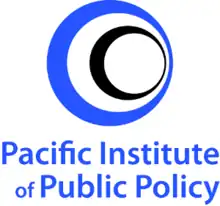Pacific Institute of Public Policy
The Pacific Institute of Public Policy (PiPP) is an independent, non-profit, regionally focused think tank based in Port Vila, Vanuatu. The stated aim of PiPP is to stimulate and support informed policy debate in the Pacific.[1] A central feature of PiPP's model of engagement with policy stakeholders is the distribution of research via several media including: research syntheses, discussion papers, forums, public debates, social networking, audio and video podcasts, press, radio and television. PiPP was established on November 21, 2007, under the Vanuatu Charitable Associations (Incorporation) Act [CAP.140]. PiPP covers policy issues across the following Pacific Island Countries: Cook Islands, Federated States of Micronesia, Fiji, Kiribati, Marshall Islands, Nauru, Niue, Palau, Papua New Guinea, Samoa, Solomon Islands, Tonga, Tuvalu, Vanuatu
 | |
| Abbreviation | PiPP |
|---|---|
| Formation | 2007 |
| Type | Foreign Policy think tank |
| Location | |
Executive Director | Derek Brien |
| Website | |
Activities
Forums and debates
Many forums facilitated by PiPP occur via the 'MP Face to Face' programme, aimed at stimulating democratic dialogue through bringing politicians to their people in an open, public forum styled question and answer setting.[2] Forums have been held across Vanuatu and have been broadcast live on Radio Vanuatu and Vanuatu's national television station (TBV).
A subregional version of the forum, known as Melanesia Face to Face, was held in Port Moresby, Papua New Guinea in 2011. Participants including the Governor of the Reserve Bank of Vanuatu, Dame Carol Kidu MP and the Director of the Melanesian Spearhead Group.
PiPP also holds Annual Pacific Debates; the inaugural event coinciding with the 41st Pacific Islands Forum meeting in Port Vila. The 2011 debate occurred in Auckland during the 42nd Pacific Islands Forum meeting held in Auckland and focused on urbanisation and economic growth in the Pacific.[3]
Pacific Poll
In 2011, PiPP conducted polling which gauged public opinion on the Melanesian Spearhead Group (MSG), the level of support for West Papuan independence,[4] and the nature of Melanesian identity.[5] The poll also measured attitudes held towards Australia.[6] This was the first poll carried out simultaneously across the four independent Melanesian countries.
Policy focus areas
Trade
Throughout 2011, PiPP contributed to discussion surrounding Vanuatu's accession to the World Trade Organisation (WTO).[7] And a report on the benefits of Vanuatu's WTO membership was published.
PiPP contributes to policy debate surrounding the Pacific Agreement on Closer Economic Relations (PACER Plus) with its insights cited in the media[8] and considered by government departments including Australia's Department of Foreign Affairs and Trade (DFAT).[9]
Information and communications technology
Since the telecommunications sector was opened to competition in 2007, PiPP has tracked the behavioural changes and trends in the use of mobile phones. The number of people owning and using mobiles is growing fast. Universal ownership is the most likely future.[10]
Urbanisation
PiPP works together with organisations including United Nations Economic and Social Commission for Asia and the Pacific (UNESCAP)[11] and the United Nations Human Settlements Programme (UN HABITAT). Apart from participation in the 2011 Pacific Urban Forum[12] PiPP has raised awareness on Pacific urban issues via a 2011 discussion paper and media engagement on issues like urbanisation.[13]
Election coverage
PiPP has been an active commentator on elections throughout the region, particularly during the 2008 Vanuatu elections which resulted in a fractured and splintered Parliament.[14]
Leadership and management structure
Derek Brien is PiPP's executive director and co-founder, and Nikunj Soni is the board chairman and founder. Board members include Dame Carol Kidu, DBE Dr (Hons), Matthew Morris, Kaliopate Tavola, Odo Tevi and Afamasaga Toleafoa. An Advisory Council exist to assist with research direction and policy agenda of the organisation with current members including diplomats, academics and high-level policymakers from throughout the Pacific and internationally.
References
- "About PiPP". Pacific Institute of Public Policy. Archived from the original on 2012-11-26.
- "Port Vila MP Fes to Fes 2011 on 15 September". Vanuatu Daily Post. 2011.
- "Pacific debate shows student support for urban drift". Pacific Scoop. 2011.
- "AWPA Supports Kubuabola". The Fiji Times Online. March 31, 2011.
- "The question of who should be in the Melanesian 'family'". Radio Australia. March 29, 2011.
- "Pacific islanders see a friend in Australia". The Australian. 2011.
- "PACIFIC UPDATE: Vanuatu's WTO deal "open" on land, but anti-WTOs say "No"". Islands Business. 2011.
- "Fiji's isolation linked to stalled PACER Plus negotiations". Radio Australia. August 18, 2011.
- "Submission to the Department of Foreign Affairs and Trade, Australia, on PACER Plus" (PDF). 2009. Archived from the original (PDF) on 2012-05-02. Retrieved 2012-05-25.
- "Governance for Growth – Mid Term Review". AusAID. Retrieved 18 June 2012.
- "Subregional Office for the Pacific".
- "Archived copy" (PDF). Archived from the original (PDF) on 2016-03-04. Retrieved 2012-05-25.
{{cite web}}: CS1 maint: archived copy as title (link) - "Rapid drift to urban areas across the Pacific". ABC Radio Australia. July 29, 2011. Retrieved 24 June 2012.
- "Vanuatu Election Result 'Unclear'". Sydney Morning Herald. 2008.